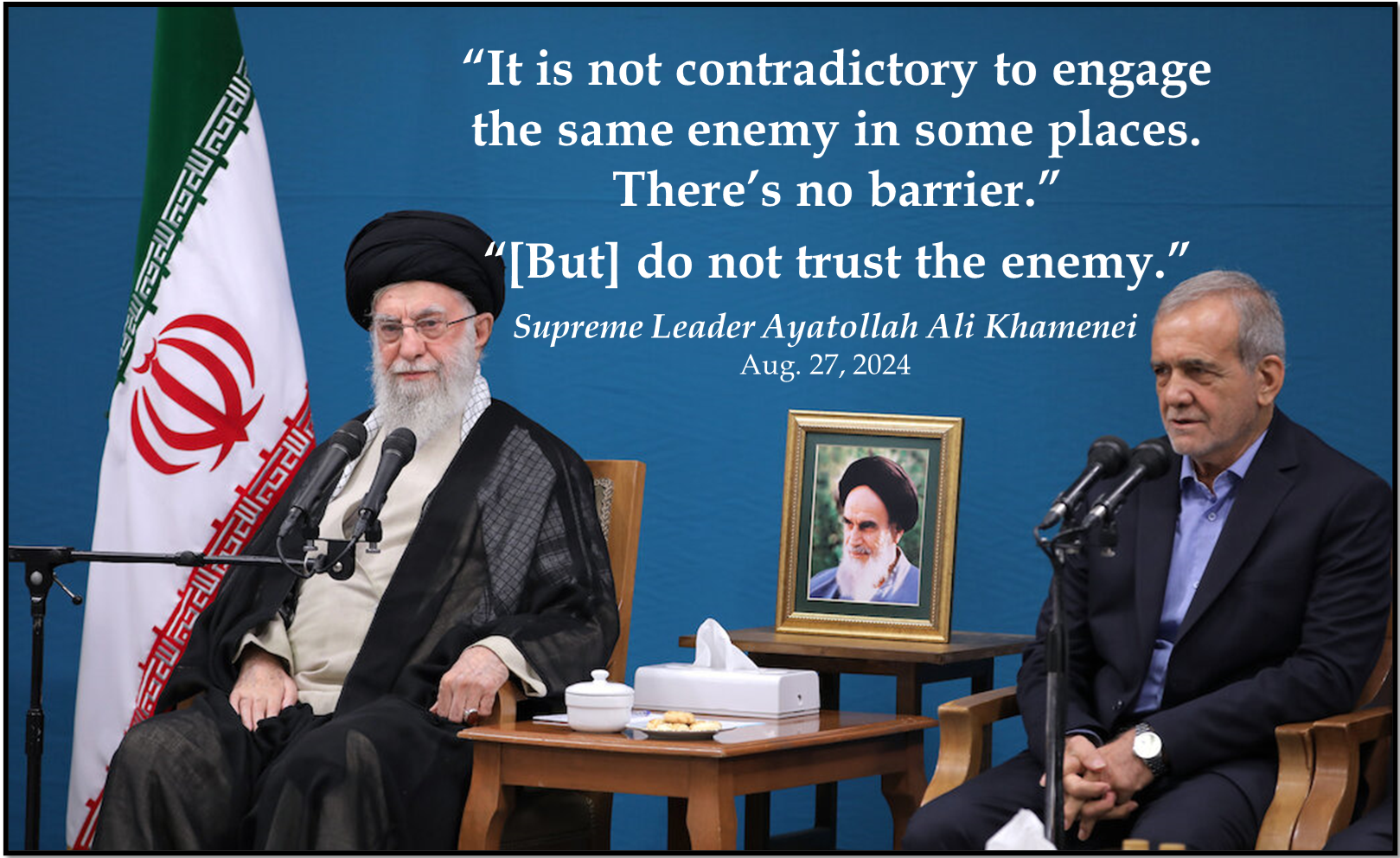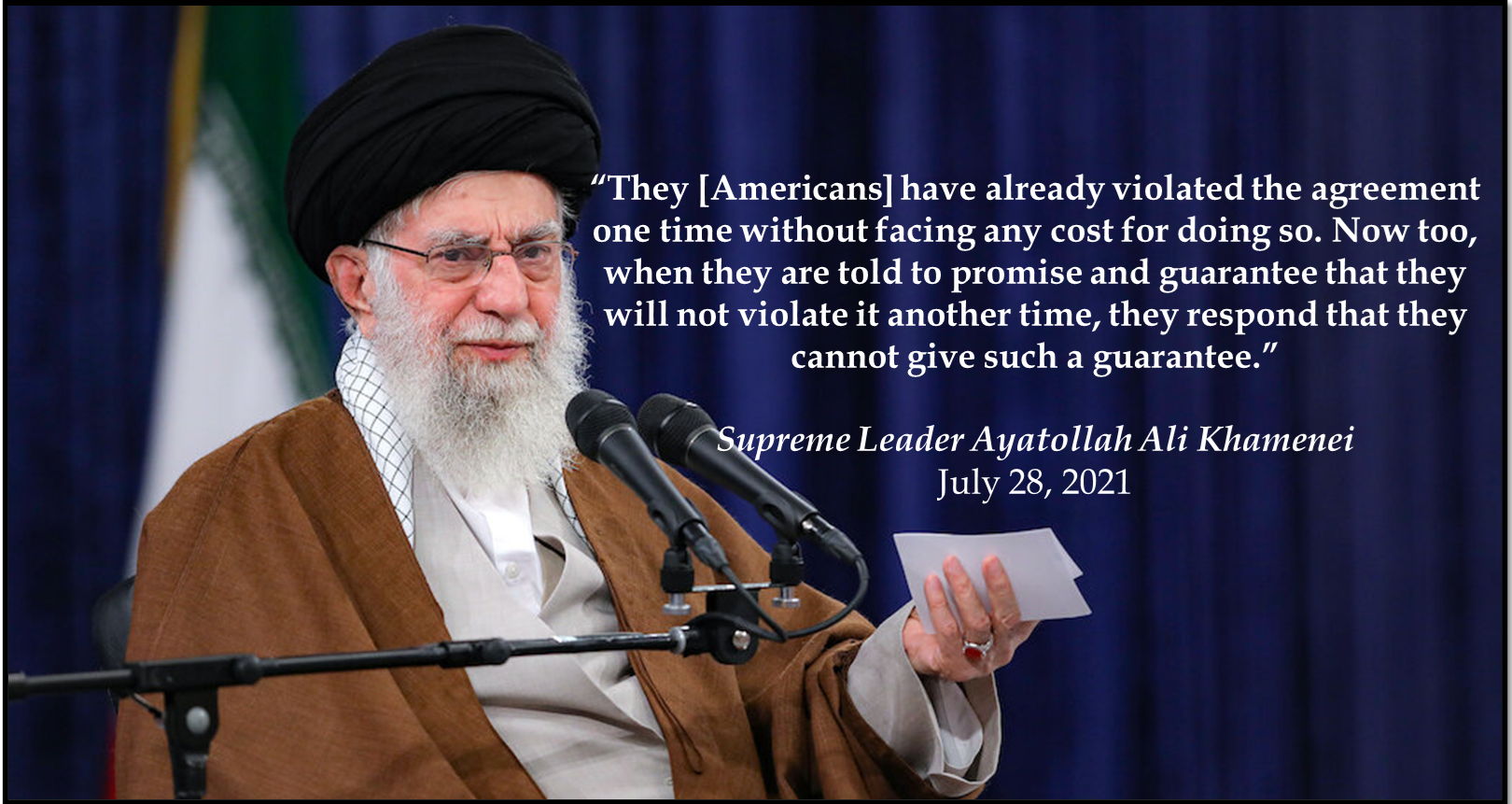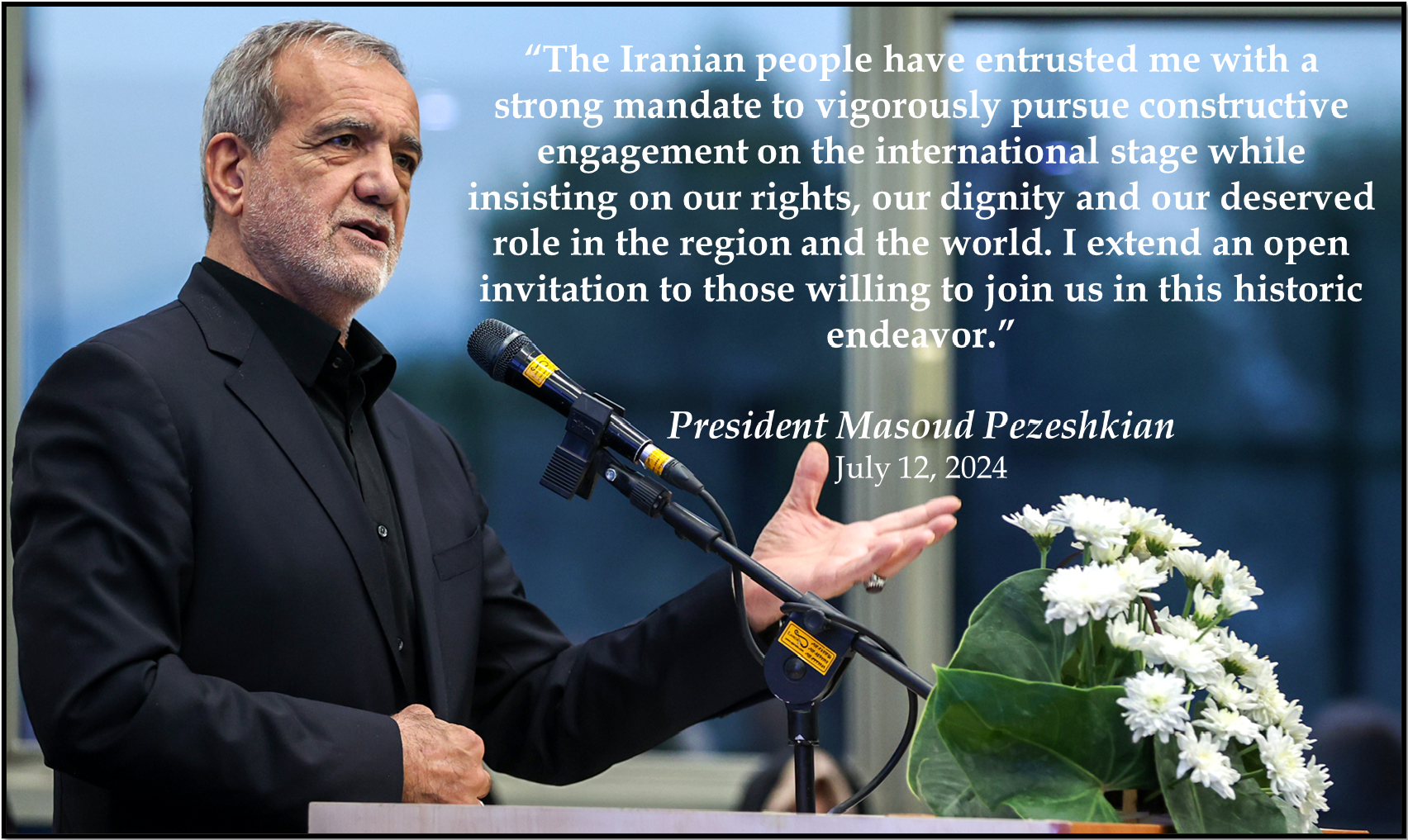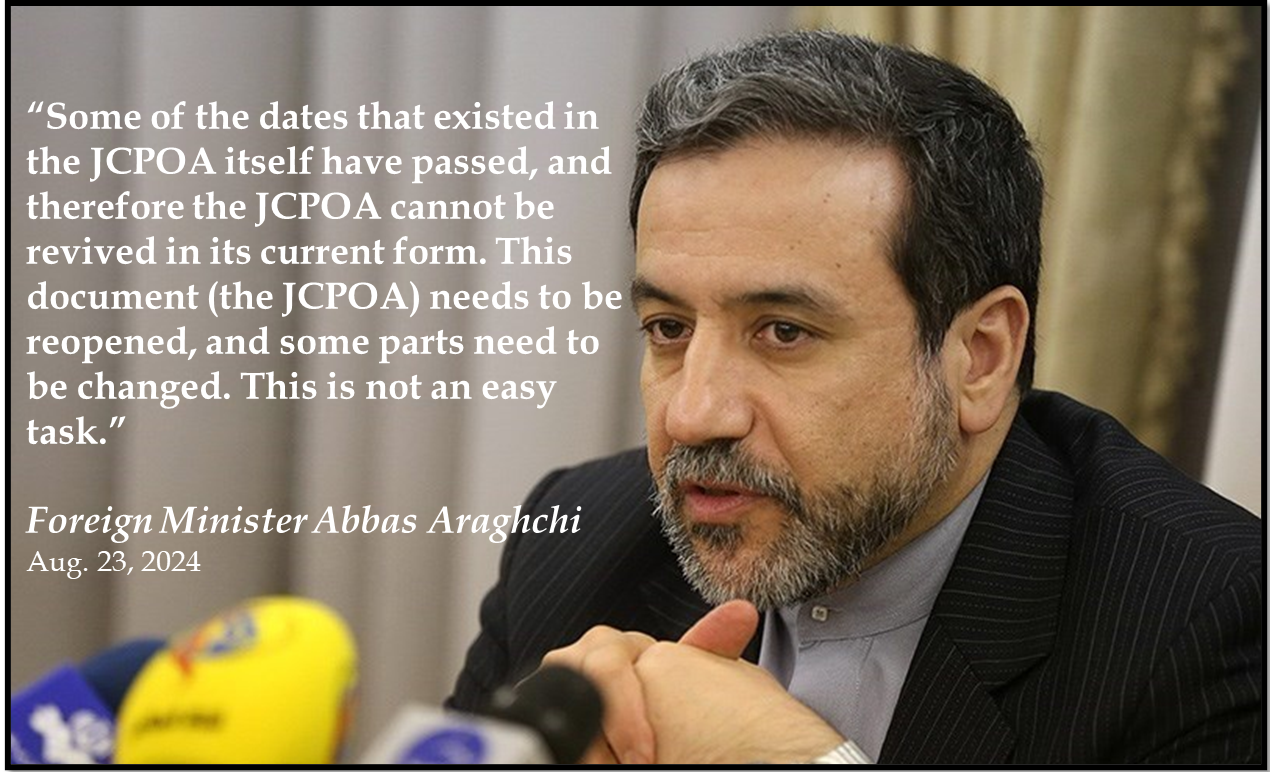Supreme Leader Ayatollah Ali Khamenei has often issued important signals about Iran’s willingness to deal with the world’s major powers, including the United States, on nuclear issues. On Aug. 27, 2024, he told Pezeshkian’s cabinet that there was “no barrier” to engaging with Iran’s “enemy,” a term that officials often use to describe the United States. But he also warned against trusting the adversary. “We do not have to pin our hope to the enemy. For our plans, we should not wait for approval by the enemies.”

The regime has made more positive comments about negotiations since the election of President Masoud Pezeshkian in July 2024. The new administration has sought economic benefits, including the lifting of economic sanctions that have shackled Iran’s economy since the United States reimposed punitive measures in 2018.
During the presidential campaign and in subsequent public statements, Pezeshkian has called for improving ties with the West and reviving the 2015 nuclear deal that had been brokered with Britain, China, France, Germany, Russia, and the United States. He argued that relief from U.S. sanctions and foreign investment were essential for significant economic growth. “No government in history has been able to achieve growth and prosperity within a cage,” he said during the July 2 presidential debate.
Foreign Minister Abbas Araghchi, a career diplomat who helped negotiate the 2015 nuclear deal, has called for new negotiations because several provisions had expired. “This document needs to be reopened and some parts need to be changed,” he said in a televised interview on August 23. “This is not an easy task.”
The State Department said that Washington would judge Tehran by its actions. “We have long said that we ultimately view diplomacy as the best way to achieve an effective, sustainable solution with regard to Iran’s nuclear program,” an official told the Associated Press. “However, we are far away from anything like that right now given Iran’s escalations across the board, including its nuclear escalations and its failure to cooperate” with the U.N. nuclear watchdog, the International Atomic Energy Agency.
Khamenei made similar remarks in 2013, when Iran began negotiations with the world’s major powers over its controversial nuclear program. “I am not against proper political moves in diplomacy. I believe in what was named many years ago as ‘heroic flexibility,’” he said in September 2013. But he was not optimistic about the talks and repeatedly warned against trusting the United States. “All the better if the negotiations bear fruit, but if there are no results, the country should rely on itself,” he said in November 2013. Khamenei, however, endorsed the 2015 deal that restricted Iran’s nuclear activities in exchange for sanctions relief. The following are Khamenei’s comments on dealing with the West and the United States from 2013 to 2024, with the most recent remarks at the top. Remarks by Pezeshkian and Araghchi are also included.
Supreme Leader Khamenei
Aug. 27, 2024: “We do not have to pin our hope to the enemy. For our plans, we should not wait for approval by the enemies.”
“It is not contradictory to engage the same enemy in some places, there’s no barrier... [but] do not trust the enemy.”
June 11, 2023: “The existing nuclear industry’s infrastructure must not be changed. During these years, managers, officials, and those who are active in this industry have done important work and built important infrastructure. You may want to sign agreements in some areas. That’s not a problem. Make agreements, but infrastructure must not be changed. Do not harm them. They are the fruits of other people’s endeavors.”
“Another fact is the unreliability of the other parties and our opponents with regard to their promises. So far during these many years – now those of you who have more experience in the nuclear field know what I am referring to – here have been many [unfulfilled] promises in different sectors, made by both the governments that were on the other side of the negotiations and by the agency itself. They made promises and did not fulfill those promises. Many times, there were unfulfilled promises and mistrust. Therefore, one of the achievements of this challenge of 20 years is that we realized we cannot trust their promises or their words. These are important achievements. Realize that these are important. We were hurt in many places because of such misplaced trust.”
July 28, 2021: “It became clear in this administration that trusting the West will not work as they are not going to help us, and they will strike a blow whenever they can. When they do not strike a blow, it is because they do not have the means to do so. Whenever they could, they struck a blow. This is a very important lesson.”

“Whenever you made our affairs contingent on reaching an agreement with the West and the U.S., you were unsuccessful and unable to advance. But whenever you didn’t count on them and began to use different methods of our own, you made progress.”
“The Americans have stuck to their obstinate position. On paper and in words, they promise to remove the sanctions, but they have not and will not remove them.”
“This is about the JCPOA (Joint Comprehensive Plan of Action) itself, about renewing it and about various other matters such as missiles and regional issues. If we say later on that we are not going to negotiate over these matters because the policies of the country and our parliament do not allow us to do so, they will say that there is no deal because we have supposedly violated it.”
“They have already violated the agreement one time without facing any cost for doing so. Now too, when they are told to promise and guarantee that they will not violate it another time, they respond that they cannot give such a guarantee. They are saying this explicitly to our friends and our diplomats. They say they cannot and will not promise such a thing.”
April 14, 2021: “We have already declared Iran's policy. Sanctions must be removed first. Once we are certain that has been done, we will carry out our commitments. This is because they have broken their promises tens of times, and it is the same now.”
“Our officials must be careful that the negotiations do not become draining. It should not reach a point where the other signatories wish to keep drawing it out, because that would be detrimental to the country.”
“The U.S. is not after accepting the truth through negotiations. Rather, it seeks to impose its false words. The Europeans have also confessed in some private meetings with our officials that Iran is in the right, and they acknowledge our policy that sanctions must be removed first.”
May 23, 2018: “The first lesson is that the Islamic Republic government cannot interact with the U.S. This is the first experience. Why? Because the US does not fulfill its commitments. Don’t say this is only true for the administration of Trump. No! The previous administration in the U.S., with whom we had meetings and talks, behaved in the same manner, but they rejected the agreement in a different manner. They also threatened [us] and went against their commitments. This is an answer to all those who, repeatedly, over time asked me, “why don’t we negotiate with the U.S., or why don’t we develop relations with the U.S.?”
“The third experience is that flexibility with regard to this enemy will not make it less aggressive, but it makes him more aggressive. When the Iranian government at the time of George W. Bush showed some flexibility, the U.S. named it the Axis of Evil. If you want to do something to reduce the animosity, do it; but it is not realized through flexibility and compromise.”
April 9, 2015: “Despite [the fact that] I was not optimistic about negotiations with the America, I did not oppose this case of negotiations. I agreed to it. I supported negotiators with all my power, and still continue to support them. I give my full support to and welcome an agreement, which would meet the interests of the Iranian nation and maintain the dignity of the Iranian nation; everybody should know this. If somebody says that I am opposed to, for example, an agreement or with reaching a point, no [this is not true and whoever saying that] has said something untrue and against the truth.”
“Nonetheless, I have serious concern. This concern is due to the fact that the other side is seriously given to deceit and lying and breaching its promises and moving in the opposite of correct direction.”
Nov. 3, 2013: “I am not optimistic about the negotiations but, with the grace of God, we will not suffer losses either… All the better if the negotiations bear fruit but if there are no results, the country should rely on itself.
“The Americans smile and express desire for negotiation; on the other hand, they immediately say that all options are on the table… We should not trust a smiling enemy.”
Sept. 17, 2013: “I am not against proper political moves in diplomacy. I believe in what was named many years ago as ‘heroic flexibility.’”
Flexibility “in certain circumstances is positive and necessary.”
“A wrestler sometimes shows flexibility for technical reasons. But he should not forget who his opponent and enemy is.”
March 21, 2013: “The Americans have been sending messages for some time asking Iran to hold separate negotiations with them regarding the nuclear issue, but on the basis of our past experiences I am not optimistic about such negotiations…”
“From the viewpoint of the Americans, negotiation does not mean that we should sit down together and try to find a logical solution. This is not what they mean by negotiation. What they mean is that we should sit down together and speak until Iran accepts their views. The goal has been announced in advance: Iran will have to accept their views. For this reason, we have always announced that this is not negotiation. This is imposition and Iran will not give in to imposition... Of course, I am not opposed either [to direct talks]…”
“Our interpretation is that offers of negotiation are an American tactic to mislead public opinion in the world and in Iran. If this is not the case, the Americans should prove their sincerity with actions…”
President Masoud Pezeshkian
July 12, 2024: “The U.S. and its Western allies, not only missed a historic opportunity to reduce and manage tensions in the region and the world, but also seriously undermined the Non-Proliferation Treaty (NPT) by showing that the costs of adhering to the tenets of the non-proliferation regime could outweigh the benefits it may offer. Indeed, the U.S. and its Western allies have abused the non-proliferation regime to fabricate a crisis regarding Iran's peaceful nuclear program - openly contradicting their own intelligence assessment - and use it to maintain sustained pressure on our people, while they have actively contributed to and continue to support the nuclear weapons of Israel...”

“I wish to emphasize that Iran’s defense doctrine does not include nuclear weapons and urge the United States to learn from past miscalculations and adjust its policy accordingly. Decision-makers in Washington need to recognize that a policy that consists of pitting regional countries against each other has not succeeded and will not succeed in the future. They need to come to terms with this reality and avoid exacerbating current tensions.”
"The Iranian people have entrusted me with a strong mandate to vigorously pursue constructive engagement on the international stage while insisting on our rights, our dignity and our deserved role in the region and the world. I extend an open invitation to those willing to join us in this historic endeavor."
July 2, 2024: “It is not the case that if the U.S. does not fulfill its commitments, we will still fulfill ours. I will not enter into negotiations (about the JCPOA) with just one option.”
“No government in history has been able to achieve growth and prosperity within a cage.”
July 1, 2024: "I believe in negotiations and diplomacy to lift the sanctions. I want to negotiate with the world. I consider the sanctions a challenge and a problem for the Iranian economy."
June 25, 2024: “I have come to rescue the people from the hardships of sanctions.” (June 25, 2024)
Foreign Minister Abbas Araghchi
Aug. 24, 2024: "We will follow the negotiations and the lifting of the sanctions in an honorable and dignified way, and as I said last night, we will not hasten or delay unnecessarily in this regard. We will start consultations with different parties so that, God willing, we can realize the interests of the Iranian nation."
Aug. 23, 2024: “I participated in six rounds of negotiations, which also continued under martyr [President Ebrahim] Raisi, but we did not reach a conclusion. Reviving those negotiations now is not an easy job. International circumstances have changed."
"Some of the dates that existed in the JCPOA itself have passed, and therefore the JCPOA cannot be revived in its current form. This document (the JCPOA) needs to be reopened, and some parts need to be changed. This is not an easy task."

"The circumstances in Europe are complicated, and the United States is entangled in an election. Nevertheless, we perceive it as our duty to remove the sanctions.”
